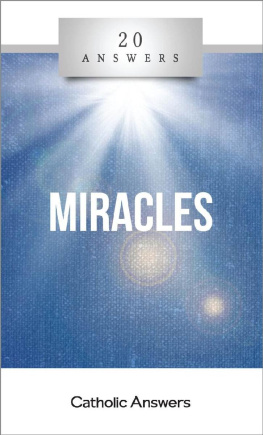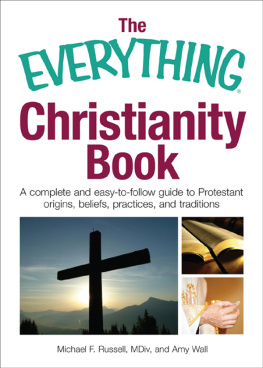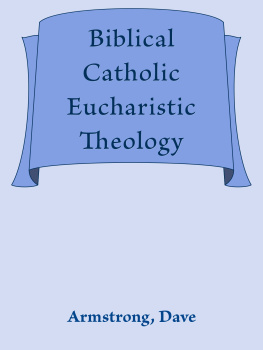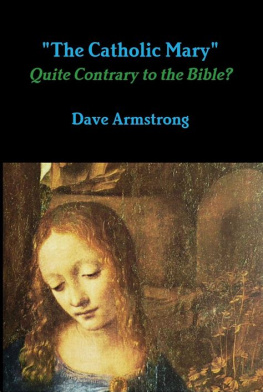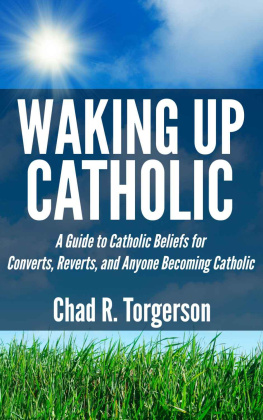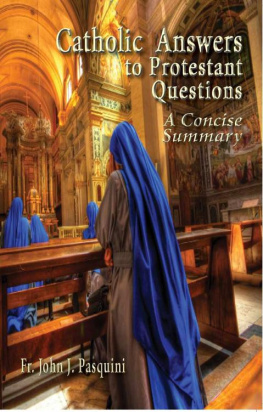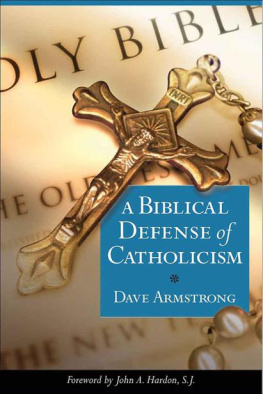Karlo Broussard - Meeting the Protestant Challenge: How to Answer 50 Biblical Objections to Catholic Beliefs
Here you can read online Karlo Broussard - Meeting the Protestant Challenge: How to Answer 50 Biblical Objections to Catholic Beliefs full text of the book (entire story) in english for free. Download pdf and epub, get meaning, cover and reviews about this ebook. year: 2019, publisher: Catholic Answers Press, genre: Religion. Description of the work, (preface) as well as reviews are available. Best literature library LitArk.com created for fans of good reading and offers a wide selection of genres:
Romance novel
Science fiction
Adventure
Detective
Science
History
Home and family
Prose
Art
Politics
Computer
Non-fiction
Religion
Business
Children
Humor
Choose a favorite category and find really read worthwhile books. Enjoy immersion in the world of imagination, feel the emotions of the characters or learn something new for yourself, make an fascinating discovery.

- Book:Meeting the Protestant Challenge: How to Answer 50 Biblical Objections to Catholic Beliefs
- Author:
- Publisher:Catholic Answers Press
- Genre:
- Year:2019
- Rating:5 / 5
- Favourites:Add to favourites
- Your mark:
- 100
- 1
- 2
- 3
- 4
- 5
Meeting the Protestant Challenge: How to Answer 50 Biblical Objections to Catholic Beliefs: summary, description and annotation
We offer to read an annotation, description, summary or preface (depends on what the author of the book "Meeting the Protestant Challenge: How to Answer 50 Biblical Objections to Catholic Beliefs" wrote himself). If you haven't found the necessary information about the book — write in the comments, we will try to find it.
Meeting the Protestant Challenge: How to Answer 50 Biblical Objections to Catholic Beliefs — read online for free the complete book (whole text) full work
Below is the text of the book, divided by pages. System saving the place of the last page read, allows you to conveniently read the book "Meeting the Protestant Challenge: How to Answer 50 Biblical Objections to Catholic Beliefs" online for free, without having to search again every time where you left off. Put a bookmark, and you can go to the page where you finished reading at any time.
Font size:
Interval:
Bookmark:
Karlo Broussard
Meeting
the
Protestant
Challenge
How to Answer 50 Biblical Objections to Catholic Beliefs

2019 Karlo Broussard
All rights reserved. Except for quotations, no part of this book may be reproduced or transmitted in any form or by any means, electronic or mechanical, including photocopying, recording, uploading to the internet, or by any information storage and retrieval system without written permission from the publisher.
All emphasis in Scripture citations added.
Published by Catholic Answers, Inc.
2020 Gillespie Way
El Cajon, California 92020
1-888-291-8000 orders
619-387-0042 fax
catholic.com
Printed in the United States of America
Cover design by eBookLaunch.com
Interior design by Russell Graphic Design
978-1-68357-144-5
978-1-68357-145-2 Kindle
978-1-68357-146-9 ePub
Acknowledgments
I would like to thank Todd Aglialoro, Catholic Answers Press director and editor, for his acceptance of this book and for all his hard work in editing it. I am also grateful to Tim Staples, Trent Horn, and Doug Beaumont for their help in research for this book. I am most grateful to Jimmy Akin, senior apologist at Catholic Answers, for his generosity in the amount of time that he spent to review the manuscript and for his helpful suggestions.
You have a fine way of rejecting the commandment of God, in order to keep your tradition... thus making void the word of God through your tradition which you hand on. Mark 7:9,13
Wheres that in the Bible?
Any Catholic who talks religion with Protestants has at some time been challenged with this question. It stems from the Protestant belief that we shouldnt accept any doctrine that isnt explicitly found in the Bible since it alone is our infallible rule of faitha belief known as sola scriptura (Latin, Scripture alone).
Much of Catholic apologetics, especially since its revival in the late eighties, has centered on answering that question, offering positive arguments for the biblical basis of Catholic doctrine. But, since Catholics dont operate on the principle of sola scriptura , we dont believe that every Christian truth has to be explicitly found in Scripture. We also appeal to truths revealed by God and preserved outside of the Bible in Sacred Tradition.
For example, Protestants may ask, Where is Marys bodily assumption in the Bible? But a Catholic can simply reply, I dont need to justify it with Scripture since I can accept it on the basis that its a part of Sacred Tradition as infallibly defined by Pope Pius XII ( Munificentissimus Deus, 1950).
Of course, a Protestant is not going to find the above response persuasive (and it would open up other debates about Christian teaching authority). But at least he cant charge a Catholic with incoherence in his belief.
There is another kind of Protestant challenge, however. This kind does charge a Catholic with incoherence: How can the Catholic Church teach X when the Bible says Y?
For example, how can the Catholic Church teach that Mary remained a virgin after Jesus birth when the Bible says that Jesus had brothers (Matt. 13:55)? Or how can the Catholic Church teach that works have a role to play in our salvation when the Bible says in Romans 3:28 that a man is justified by faith apart from works of law.
This is the kind of challenge that a Catholic must meet because whatever the Church teaches, even if derived principally from Sacred Tradition and not the Bible, cannot contradict the Bible. Scripture and Tradition are two streams of revelation that flow from the same source: God.
Our task as Catholics, therefore, is to show that Catholic teaching doesnt contradict those Bible passages that some Protestants think pose a threat to it. The purpose of this book is to help you fulfill this task.
We will examine fifty challenges that Protestants commonly make from the Bible, covering a variety of topics concerning Church authority, Scripture and Tradition, salvation, the sacraments, Mary and the saints, eschatology, and Catholic life and practice. Most of the challenges come from mainstream Protestantism, but some come from smaller groups within Protestantism, such as Seventh-day Adventists.
Each chapter offers you a series of ways to meet these challenges, ultimately showing that the challenges dont succeed in proving Catholic beliefs to be contrary to the Bible. Following these is a counter-challenge you can propose to help your Protestant friend think more critically about his own assumptions.
Of course, these fifty biblical challenges dont exhaust the challenges that Protestants make against Catholic teaching. But they do offer a good sampling of what a Catholic might encounter.
I hope this book will help you be more efficient in your conversations with Protestants. Also, I hope it will strengthen your own faith, helping you to know that in embracing Catholic teaching you are not making void the word of God through your tradition which you hand on (Mark 7:13).
I
Church Hierarchy & Authority
Many Protestants dont think Jesus established a church with any hierarchical structure, much less with a single figure who has the highest rank of authority, like a pope. They argue that Jesus Church is merely an invisible community of believers united by grace rather than a society with visible markers.
Their motivation for this belief is commendable because they think its what the Bible teaches. And there are certain biblical passages they commonly bring up as evidence for their belief.
As well see, though, its not a matter of either a hierarchical and visible Church or an invisible community, but of both/and. As you meet these challenges, you may help Protestants come to a fuller, more biblically accurate view of the Church that Jesus established.
James Led the Council
Acts 15:13-29 and Peters Primacy
How can the Catholic Church teach that Peter was the leader of the first-century Church when the Bible teaches that James was the leader of the Council of Jerusalem?
The Catechism of the Catholic Church (CCC) teaches that Christ instituted Peter as the head of the college of the apostles (880), and therefore that the pope , Peters successor as the bishop of Rome, is the perpetual and visible source and foundation of the unity both of the bishops and of the whole company of the faithful (882).
But Protestants argue that the Bible teaches otherwise. Some appeal to the proceedings of the Council of Jerusalem recorded in Acts 15. The council was convened due to an early Church debate over how a person is to be saved. According to Acts 15:1, some of the Jewish converts to Christianity were teaching that circumcision was necessary for salvation. Luke (the author of Acts) tells us that Paul and Barnabas had no small dissension and debate with them (v.2), and that in order to settle the question they were appointed to go and meet with the apostles and elders in Jerusalem.
Some Protestants, appealing to Acts 15, argue that James the Just (aka the Lords brother) was in charge of the council, proving that Peter could not have been head of the early Church as the first pope. They point to Jamess use of the imperative mood for listen (Greek, akou ) as proof for this: Brethren, listen [ akousate ] to me (v.13). Moreover, they assert that James decides the results of the council when he says, Therefore my judgment is that we should not trouble those of the Gentiles who turn to God (v.19).
MEETING THE CHALLENGE
1. The imperative mood for akou doesnt necessarily connote authority over the group.
Font size:
Interval:
Bookmark:
Similar books «Meeting the Protestant Challenge: How to Answer 50 Biblical Objections to Catholic Beliefs»
Look at similar books to Meeting the Protestant Challenge: How to Answer 50 Biblical Objections to Catholic Beliefs. We have selected literature similar in name and meaning in the hope of providing readers with more options to find new, interesting, not yet read works.
Discussion, reviews of the book Meeting the Protestant Challenge: How to Answer 50 Biblical Objections to Catholic Beliefs and just readers' own opinions. Leave your comments, write what you think about the work, its meaning or the main characters. Specify what exactly you liked and what you didn't like, and why you think so.

